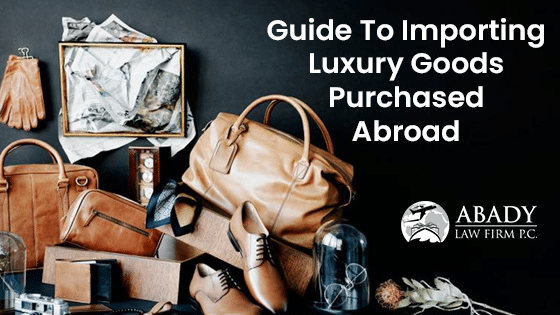
Have you ever marveled at the opportunity of purchasing luxury goods abroad at significantly lower prices compared to the United States? Congratulations on your wise decision! However, if you’re unfamiliar with the intricacies of importing high-value items from overseas, fear not. This comprehensive guide is tailored to assist you every step of the way.
Expert Strategies for Importing Items from Overseas
Importing luxury goods from overseas may seem daunting initially. To navigate this process seamlessly and avoid costly errors, it’s crucial to be well-informed and prepared.
Here are five expert tips for importing items from overseas:
1. Familiarize Yourself with Customs Regulations
U.S. Customs and Border Protection (CBP) enforces stringent regulations governing the importation of goods into the country. For instance, products must be accurately labeled with their country of origin, such as “Made in China,” to comply with CBP standards. You can review CBP’s “What to Expect When You Return” here
2. Conduct Market Research
Before embarking on your shopping spree abroad, conduct thorough research to identify prime locations for purchasing luxury items and ascertain typical price ranges. Utilize online resources to compare prices and ensure authenticity, bearing in mind the adage: “If it seems too good to be true, it probably is.”
3. Navigate Customs Regulations with Care
When importing goods into the United States, meticulous attention to customs regulations and duties is essential. Consulting a licensed Customs broker or attorney can streamline the process, ensuring proper completion of paperwork and providing guidance on potential duties and fees.
Understanding Importing Luxury Items to the U.S.
Duty-Free Exemptions: Personal exemptions that do not require the traveler to pay duty will be $200, $800 or $1600 depending on the countries you visited.
The duty-free exemptions ($200, $800, or $1600) apply if:
- The items are for your personal or household use or intended to be given as gifts.
- Merchandise is in your possession, that is, it accompanies you when you return to the United States. Items to be sent later may not be included in your duty-free exemption. (Exceptions apply for goods sent from Guam or the U.S. Virgin Islands.)
- Merchandise is declared to CBP. If you do not declare something that should have been declared, you risk forfeiting the item. If in doubt, declare it.
- You are returning from an overseas stay of at least 48 hours. This time limit does not apply if you are returning from Mexico or from the U.S. Virgin Islands.
- You have not used all of your exemption allowance, or used any part of it, in the past 30 days. For example, if you go to England and bring back $150 worth of items, you must wait another 30 days before you are allowed another exemption.
- The items are not prohibited or restricted as discussed in the section on Prohibited and Restricted Items. Before departing on your trip, check the latest information for the full list of prohibited and restricted items on the U.S. Department of the Treasury Cuba Sanctions website, as well as other related government resources.
Duty free exemption limits depend on the country or countries you visit and the length of stay.
Prohibited and Restricted Items: Refer to the U.S. Customs and Border Protection website for a comprehensive list of prohibited or restricted items. Pay particular attention to restrictions on luxury food products when importing from Europe.
Compliance with U.S. Customs
Declaration Requirements: Honesty and transparency are paramount when declaring luxury goods at U.S. Customs. Failure to declare items accurately can result in penalties and further inspection, emphasizing the importance of adherence to regulations.
Avoiding Fines at Customs: To navigate customs smoothly and avoid fines, familiarize yourself with personal exemptions, declare all items accurately, and adhere to customs regulations pertinent to your travel circumstances.
Shipping Considerations: Shipping luxury items overseas entails additional considerations, including import regulations, potential duties or taxes, and selecting a reputable carrier offering tracking and insurance options.
Consequences of False Declarations
Mitigating Risks: Falsely declaring goods can lead to severe consequences, including seizure and exorbitant duty rates. Consulting legal experts can provide clarity on rights and ensure compliance with regulations, emphasizing honesty as the best policy.
Handling Seizures: In the unfortunate event of customs seizing a luxury item, various outcomes are possible. Options include paying a fine for immediate release, filing a petition or claim for item retrieval, or facing destruction or auction if no action is taken. At this point, best to consult with an attorney on what option to choose.
Global Entry: It’s important to note that violating customs regulations can result in the loss of your Global Entry privileges.
Final Thoughts
Importing luxury goods presents complexities that necessitate meticulous planning and adherence to regulations. Engage with a trusted Customs broker or attorney to navigate legal requirements and avoid penalties associated with duty and tax evasion.
For expert guidance on importing luxury goods, feel free to reach out to us. Our team is dedicated to addressing your queries and facilitating seamless importation across borders.
If you want, you can contact us at CustomsESQ for any questions about the importation of luxury goods. We are always happy to answer your questions and guide you through the complexities of importing into cross-border affairs.

